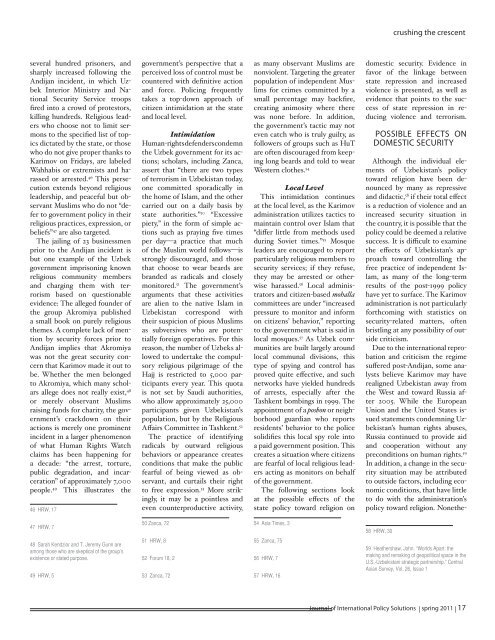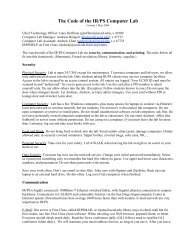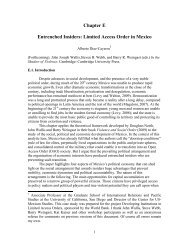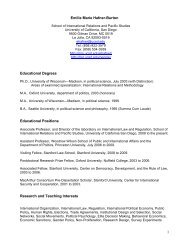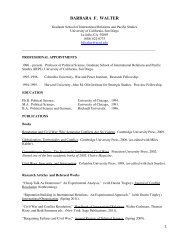to download the full journal. (1.2MB PDF) - School of International ...
to download the full journal. (1.2MB PDF) - School of International ...
to download the full journal. (1.2MB PDF) - School of International ...
You also want an ePaper? Increase the reach of your titles
YUMPU automatically turns print PDFs into web optimized ePapers that Google loves.
crushing <strong>the</strong> crescent<br />
several hundred prisoners, and<br />
sharply increased following <strong>the</strong><br />
Andijan incident, in which Uzbek<br />
Interior Ministry and National<br />
Security Service troops<br />
fired in<strong>to</strong> a crowd <strong>of</strong> protes<strong>to</strong>rs,<br />
killing hundreds. Religious leaders<br />
who choose not <strong>to</strong> limit sermons<br />
<strong>to</strong> <strong>the</strong> specified list <strong>of</strong> <strong>to</strong>pics<br />
dictated by <strong>the</strong> state, or those<br />
who do not give proper thanks <strong>to</strong><br />
Karimov on Fridays, are labeled<br />
Wahhabis or extremists and harassed<br />
or arrested. 46 This persecution<br />
extends beyond religious<br />
leadership, and peaceful but observant<br />
Muslims who do not “defer<br />
<strong>to</strong> government policy in <strong>the</strong>ir<br />
religious practices, expression, or<br />
beliefs” 47 are also targeted.<br />
The jailing <strong>of</strong> 23 businessmen<br />
prior <strong>to</strong> <strong>the</strong> Andijan incident is<br />
but one example <strong>of</strong> <strong>the</strong> Uzbek<br />
government imprisoning known<br />
religious community members<br />
and charging <strong>the</strong>m with terrorism<br />
based on questionable<br />
evidence: The alleged founder <strong>of</strong><br />
<strong>the</strong> group Akromiya published<br />
a small book on purely religious<br />
<strong>the</strong>mes. A complete lack <strong>of</strong> mention<br />
by security forces prior <strong>to</strong><br />
Andijan implies that Akromiya<br />
was not <strong>the</strong> great security concern<br />
that Karimov made it out <strong>to</strong><br />
be. Whe<strong>the</strong>r <strong>the</strong> men belonged<br />
<strong>to</strong> Akromiya, which many scholars<br />
allege does not really exist, 48<br />
or merely observant Muslims<br />
raising funds for charity, <strong>the</strong> government’s<br />
crackdown on <strong>the</strong>ir<br />
actions is merely one prominent<br />
incident in a larger phenomenon<br />
<strong>of</strong> what Human Rights Watch<br />
claims has been happening for<br />
a decade: “<strong>the</strong> arrest, <strong>to</strong>rture,<br />
public degradation, and incarceration”<br />
<strong>of</strong> approximately 7,000<br />
people. 49 This illustrates <strong>the</strong><br />
46 HRW, 17<br />
government’s perspective that a<br />
perceived loss <strong>of</strong> control must be<br />
countered with definitive action<br />
and force. Policing frequently<br />
takes a <strong>to</strong>p-down approach <strong>of</strong><br />
citizen intimidation at <strong>the</strong> state<br />
and local level.<br />
Intimidation<br />
Human-rights defenders condemn<br />
<strong>the</strong> Uzbek government for its actions;<br />
scholars, including Zanca,<br />
assert that “<strong>the</strong>re are two types<br />
<strong>of</strong> terrorism in Uzbekistan <strong>to</strong>day,<br />
one committed sporadically in<br />
<strong>the</strong> home <strong>of</strong> Islam, and <strong>the</strong> o<strong>the</strong>r<br />
carried out on a daily basis by<br />
state authorities.” 50 “Excessive<br />
piety,” in <strong>the</strong> form <strong>of</strong> simple actions<br />
such as praying five times<br />
per day—a practice that much<br />
<strong>of</strong> <strong>the</strong> Muslim world follows—is<br />
strongly discouraged, and those<br />
that choose <strong>to</strong> wear beards are<br />
branded as radicals and closely<br />
moni<strong>to</strong>red. 51 The government’s<br />
arguments that <strong>the</strong>se activities<br />
are alien <strong>to</strong> <strong>the</strong> native Islam in<br />
Uzbekistan correspond with<br />
<strong>the</strong>ir suspicion <strong>of</strong> pious Muslims<br />
as subversives who are potentially<br />
foreign operatives. For this<br />
reason, <strong>the</strong> number <strong>of</strong> Uzbeks allowed<br />
<strong>to</strong> undertake <strong>the</strong> compulsory<br />
religious pilgrimage <strong>of</strong> <strong>the</strong><br />
Hajj is restricted <strong>to</strong> 5,000 participants<br />
every year. This quota<br />
is not set by Saudi authorities,<br />
who allow approximately 25,000<br />
participants given Uzbekistan’s<br />
population, but by <strong>the</strong> Religious<br />
Affairs Committee in Tashkent. 52<br />
The practice <strong>of</strong> identifying<br />
radicals by outward religious<br />
behaviors or appearance creates<br />
conditions that make <strong>the</strong> public<br />
fearful <strong>of</strong> being viewed as observant,<br />
and curtails <strong>the</strong>ir right<br />
<strong>to</strong> free expression. 53 More strikingly,<br />
it may be a pointless and<br />
even counterproductive activity,<br />
as many observant Muslims are<br />
nonviolent. Targeting <strong>the</strong> greater<br />
population <strong>of</strong> independent Muslims<br />
for crimes committed by a<br />
small percentage may backfire,<br />
creating animosity where <strong>the</strong>re<br />
was none before. In addition,<br />
<strong>the</strong> government’s tactic may not<br />
even catch who is truly guilty, as<br />
followers <strong>of</strong> groups such as HuT<br />
are <strong>of</strong>ten discouraged from keeping<br />
long beards and <strong>to</strong>ld <strong>to</strong> wear<br />
Western clo<strong>the</strong>s. 54<br />
Local Level<br />
This intimidation continues<br />
at <strong>the</strong> local level, as <strong>the</strong> Karimov<br />
administration utilizes tactics <strong>to</strong><br />
maintain control over Islam that<br />
“differ little from methods used<br />
during Soviet times.” 55 Mosque<br />
leaders are encouraged <strong>to</strong> report<br />
particularly religious members <strong>to</strong><br />
security services; if <strong>the</strong>y refuse,<br />
<strong>the</strong>y may be arrested or o<strong>the</strong>rwise<br />
harassed. 56 Local administra<strong>to</strong>rs<br />
and citizen-based mohalla<br />
committees are under “increased<br />
pressure <strong>to</strong> moni<strong>to</strong>r and inform<br />
on citizens’ behavior,” reporting<br />
<strong>to</strong> <strong>the</strong> government what is said in<br />
local mosques. 57 As Uzbek communities<br />
are built largely around<br />
local communal divisions, this<br />
type <strong>of</strong> spying and control has<br />
proved quite effective, and such<br />
networks have yielded hundreds<br />
<strong>of</strong> arrests, especially after <strong>the</strong><br />
Tashkent bombings in 1999. The<br />
appointment <strong>of</strong> a posbon or neighborhood<br />
guardian who reports<br />
residents’ behavior <strong>to</strong> <strong>the</strong> police<br />
solidifies this local spy role in<strong>to</strong><br />
a paid government position. This<br />
creates a situation where citizens<br />
are fearful <strong>of</strong> local religious leaders<br />
acting as moni<strong>to</strong>rs on behalf<br />
<strong>of</strong> <strong>the</strong> government.<br />
The following sections look<br />
at <strong>the</strong> possible effects <strong>of</strong> <strong>the</strong><br />
state policy <strong>to</strong>ward religion on<br />
domestic security. Evidence in<br />
favor <strong>of</strong> <strong>the</strong> linkage between<br />
state repression and increased<br />
violence is presented, as well as<br />
evidence that points <strong>to</strong> <strong>the</strong> success<br />
<strong>of</strong> state repression in reducing<br />
violence and terrorism.<br />
POSSIBLE EFFECTS ON<br />
DOMESTIC SECURITY<br />
Although <strong>the</strong> individual elements<br />
<strong>of</strong> Uzbekistan’s policy<br />
<strong>to</strong>ward religion have been denounced<br />
by many as repressive<br />
and didactic, 58 if <strong>the</strong>ir <strong>to</strong>tal effect<br />
is a reduction <strong>of</strong> violence and an<br />
increased security situation in<br />
<strong>the</strong> country, it is possible that <strong>the</strong><br />
policy could be deemed a relative<br />
success. It is difficult <strong>to</strong> examine<br />
<strong>the</strong> effects <strong>of</strong> Uzbekistan’s approach<br />
<strong>to</strong>ward controlling <strong>the</strong><br />
free practice <strong>of</strong> independent Islam,<br />
as many <strong>of</strong> <strong>the</strong> long-term<br />
results <strong>of</strong> <strong>the</strong> post-1999 policy<br />
have yet <strong>to</strong> surface. The Karimov<br />
administration is not particularly<br />
forthcoming with statistics on<br />
security-related matters, <strong>of</strong>ten<br />
bristling at any possibility <strong>of</strong> outside<br />
criticism.<br />
Due <strong>to</strong> <strong>the</strong> international reprobation<br />
and criticism <strong>the</strong> regime<br />
suffered post-Andijan, some analysts<br />
believe Karimov may have<br />
realigned Uzbekistan away from<br />
<strong>the</strong> West and <strong>to</strong>ward Russia after<br />
2005. While <strong>the</strong> European<br />
Union and <strong>the</strong> United States issued<br />
statements condemning Uzbekistan’s<br />
human rights abuses,<br />
Russia continued <strong>to</strong> provide aid<br />
and cooperation without any<br />
preconditions on human rights. 59<br />
In addition, a change in <strong>the</strong> security<br />
situation may be attributed<br />
<strong>to</strong> outside fac<strong>to</strong>rs, including economic<br />
conditions, that have little<br />
<strong>to</strong> do with <strong>the</strong> administration’s<br />
policy <strong>to</strong>ward religion. None<strong>the</strong>-<br />
47 HRW, 7<br />
50 Zanca, 72<br />
54 Asia Times, 3<br />
58 HRW, 30<br />
48 Sarah Kendzior and T. Jeremy Gunn are<br />
among those who are skeptical <strong>of</strong> <strong>the</strong> group’s<br />
existence or stated purpose.<br />
49 HRW, 5<br />
51 HRW, 8<br />
52 Forum 18, 2<br />
53 Zanca, 72<br />
55 Zanca, 75<br />
56 HRW, 7<br />
57 HRW, 16<br />
59 Hea<strong>the</strong>rshaw, John. “Worlds Apart: <strong>the</strong><br />
making and remaking <strong>of</strong> geopolitical space in <strong>the</strong><br />
U.S.-Uzbekistani strategic partnership.” Central<br />
Asian Survey, Vol. 26, Issue 1<br />
Journal <strong>of</strong> <strong>International</strong> Policy Solutions | spring 2011 | 17


